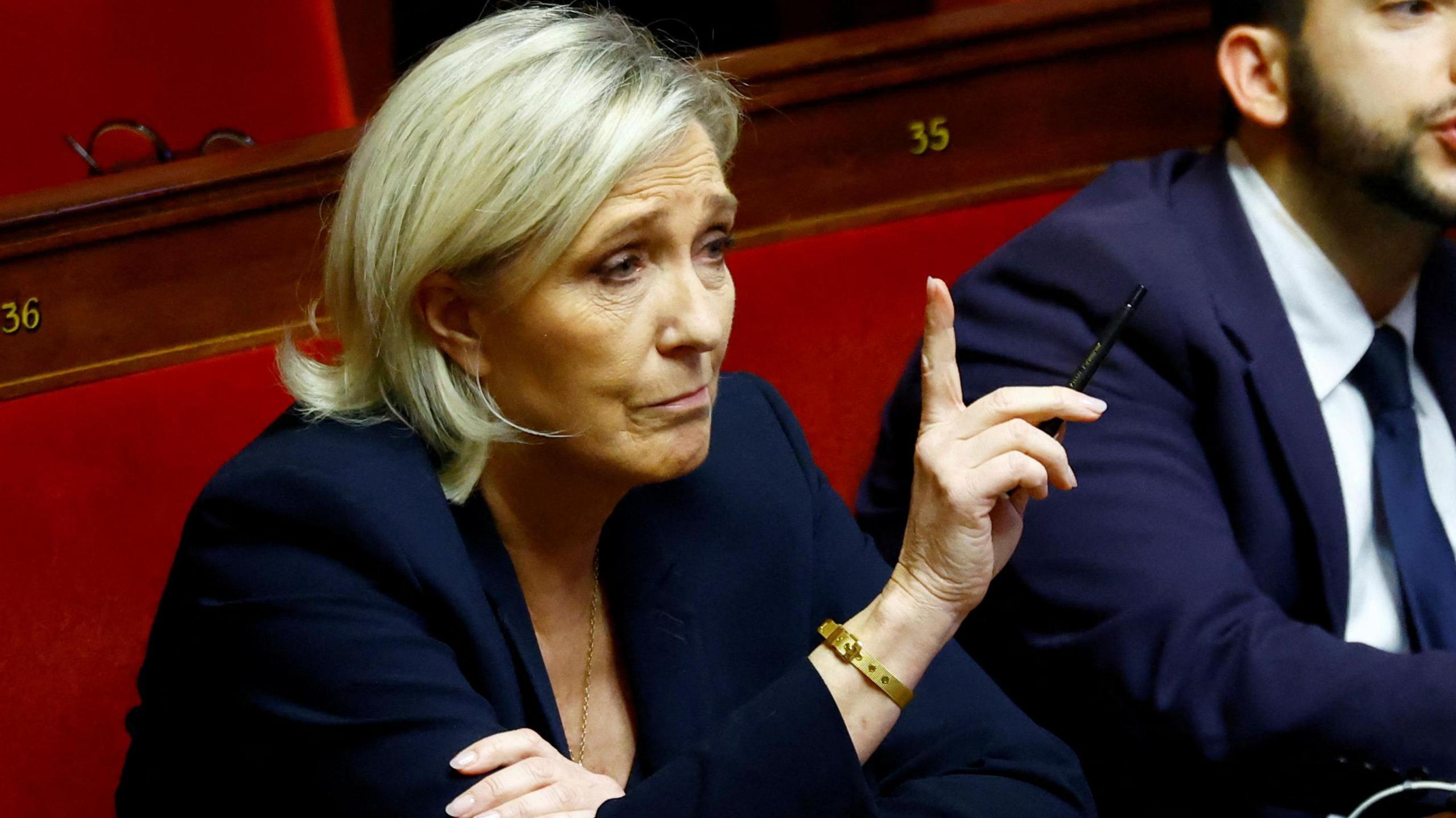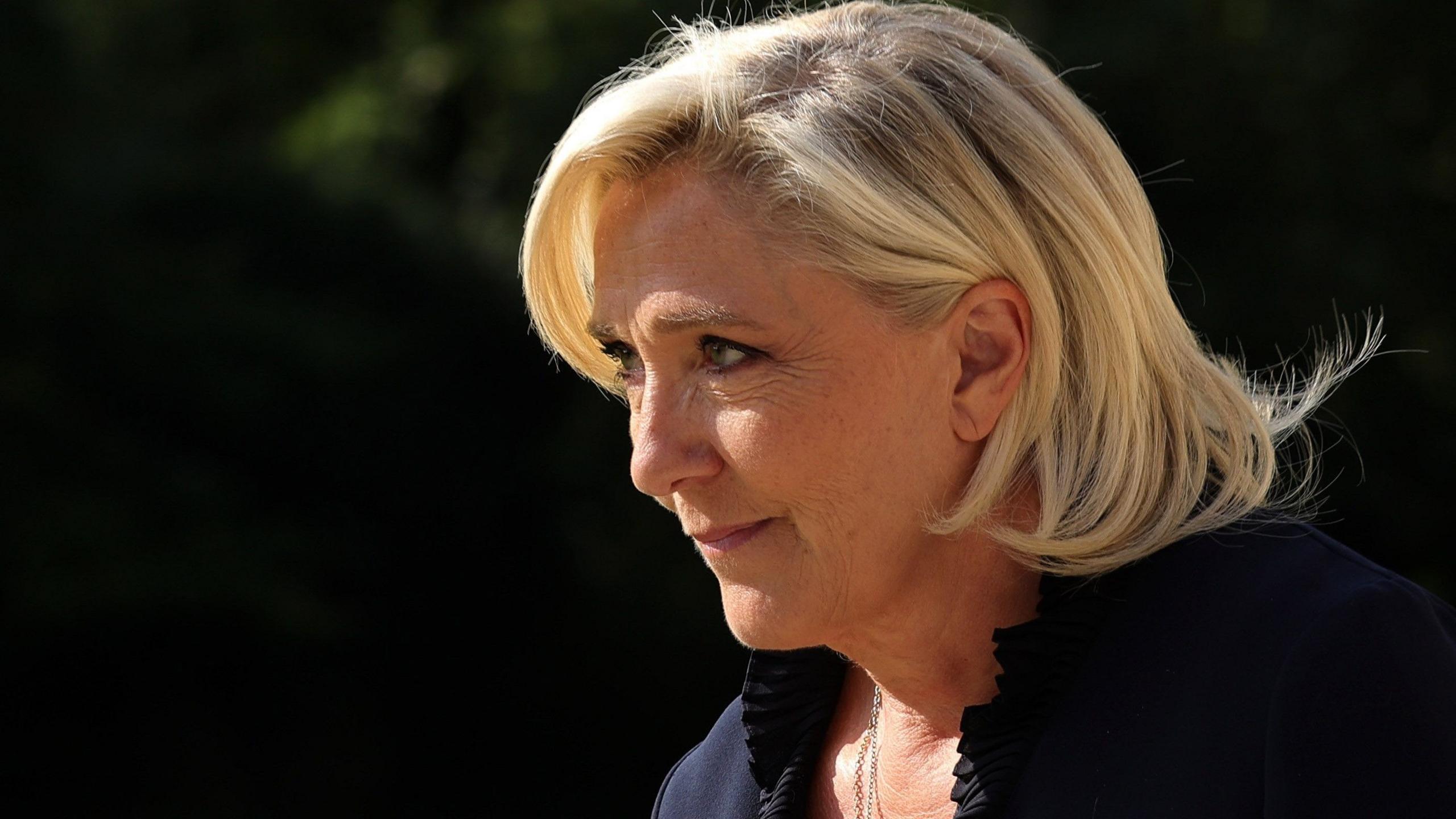Moment of big opportunity and high risk for Marine Le Pen

Marine Le Pen has played a waiting game for years as National Rally’s leader
- Published
Backing the collapse of Michel Barnier's French government is a high-stakes moment for Marine Le Pen.
It could lead to her best chance of power yet as head of France’s far-right National Rally.
"I'm not calling for Emmanuel Macron's resignation," she said, but she made it perfectly clear he was responsible for France's political deadlock and "pressure on the president will become stronger and stronger".
Before she had decided to push for Barnier's downfall, she said she wasn’t "the master of the clocks" - the one who dictated the agenda.
But that may well be exactly what she now becomes, by bringing down Emmanuel Macron’s second government since he beat her to the presidency for a second time in 2022.
As his presidency looks ever weaker, it is Le Pen who appears to have the upper hand.
However, this situation is not without immense risks for her too.
Le Pen has played a waiting game for years as National Rally’s leader. She may be tantalisingly close to power now - but she is having to make big choices.
Pushing for a no-confidence vote "comes as a considerable risk because people are now wondering if she’s really acting in the interests of the country or her own, personal interests," says Prof Armin Steinbach of HEC business school in Paris.
“What is obvious is that it’s not about Barnier... it’s about her trying to overthrow and weaken Macron, obviously for her personal ambitions to herself become the next president,” he told the BBC.
Le Pen has long sought to “normalise” National Rally (RN) in the eyes of the French people, rebranding it six years ago from her father’s old National Front.
Jump back a few months to France’s snap parliamentary elections when RN came first with 32% of the vote. Her mission appeared almost complete, even if it could only manage third place in the run-off round.
Now in the dying days of 2024, she is taking a gamble on whether French voters will see her as acting in the national interest in bringing down a weakened government because she objects to its 2025 budget that aims to bring down France’s budget deficit from 6% of national output, or GDP.
Barnier had already agreed to several of her demands on social security - but Le Pen decided it was not enough.
There are real economic risks for France, as well as real political risks for Le Pen in backing a left-sponsored vote of no confidence.
After only three months in the job, Barnier has appealed to MPs to act in France’s greater interest, but Le Pen’s party leader Jordan Bardella has accused him of adopting a “strategy of fear”.
Le Pen’s colleagues are sensing Macron’s potential downfall.
RN adviser Philippe Olivier told Le Monde the president was “a fallen republican monarch, advancing with his shirt open and a rope around his neck up to the next dissolution [of parliament]”.
It was Macron’s surprise decision to call an early parliamentary election in June that has left France in the political deadlock it finds itself now.
Le Pen’s argument is that Barnier didn’t include enough of her demands in his budget, while Barnier said his budget wasn’t “aimed to please” - and he accused her of "trying to get into a kind of bidding war" during their negotiations.
The RN leader could end up plunging France “into the great political and financial unknown”, in the words of Le Figaro deputy editor Vincent Trémolet de Villers.
She won’t want to be labelled as the politician who pushed France into economic turbulence when in her eyes it is Macron who is to blame for France’s economic state.
“It’s a result of seven years of amateurism and a spectacular drift in our public finances,” she has said.
There are plenty of French voters who want Macron gone before his term ends in 2027. Recent polls suggest at least 62% of the electorate think the president should resign if the Barnier government falls.
National Rally would arguably be in line with the broader electorate if it pushed for that, even if Le Pen has not yet done so.
But the RN leader has other issues going on behind the scenes which her critics believe might be influencing her judgement.
On 31 March, a French court will rule in a long-running trial against her and other party figures on allegations of misuse of European Parliament funding.
Prosecutors want her to go to jail and face a five-year ban in public office.
If that were to happen, her hopes of winning the presidency would be dashed.
For Marine Le Pen this moment really could be now or never.
Three times she has run for the top job. If she does get to run a fourth time in the coming months she is in with a strong chance of winning.
Jordan Bardella is already considered more popular than Le Pen both within National Rally and beyond, and if Macron does see out his term, the 29-year-old party chief would be favourite to run in 2027.
No French government has fallen after a no-confidence vote since 1962.
Get this wrong and Le Pen may not be forgiven next time France goes to the ballot box.
Related topics
- Published7 July 2024

- Published7 July 2024

- Published30 September 2024
